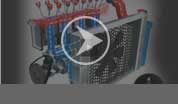Category Archives: Service Standards
Arrive Alive In Des Moines
We’ve all seen IA drivers do crazy things while driving to or from Altoona. A guy shaving in the rear-view mirror, a woman applying makeup, people talking on their phones, texting or drinking from an enormous coffee mug. It’s a wonder we even dare drive on IA roads.
The truth is that all of us Des Moines drivers are distracted when we drive. Unfortunately, traffic, road construction and other detrimental external factors are beyond our control. The distractions inside our car, however, are things we can often control.
Here’s some things that’ll give you more control in your car, and help keep your attention on the roads around Altoona, IA.
- Des Moines drivers who are 16 to 20 years old tend to be more distracted by the radio, CD or MP3 player.
- Des Moines motorists who are 20 to 29 are more distracted by passengers in the car, including small children.
- Those over age 65 tend to be more distracted by objects or events that are outside of the vehicle.
Other factors like fatigue, stress and lack of sleep make it harder to pay attention to driving – no matter what age we are. It is always better to pull over and take a quick nap than risk falling asleep at the wheel. Des Moines car owners are also distracted by thinking about relationships, family issues, money and bills. So what can Des Moines drivers do to manage these harmful distractions? Well, the first thing is to eliminate as many as we can.
When you get in your car, make sure you’re belted in; that the seats, steering wheel and mirrors are adjusted; and your radio or CD player is ready.
Secure any loose objects in the car that can fall on the floor and interfere with your driving.
If you have a drink, make sure it’s spill-proof and put in a cup holder. Des Moines motorists’ pets should also be contained.
IA motorists with kids in the car should make sure they’re clipped in their seat belts or safety seats. You may want to give them some distractions to help keep them quiet and sitting in their seats. Don’t get involved in their arguments while you’re driving. Pull over if you need to find a toy or break up a fight.
If you eat while driving, choose simple finger foods that aren’t messy.
Learning your car’s controls before you drive is another vital way to improve your safety. Learn how to work the radio by touch. Controls located on the steering wheel can help Des Moines car owners keep their eyes on the road. The same goes for heating and air conditioning controls.
If you have to use a cell phone, a hands-free system is best. But remember, the biggest cell phone distraction isn’t the phone itself – it’s the conversation. Keep conversations brief and light, or pull over if you can. Your critical reaction time is much slower when talking and driving, so allow more space between you and the car ahead of you. Know your local Altoona laws – it may be illegal to be on the phone. Never text while driving! This has already caused many deaths and injuries in IA over the last few years.
And if you really think you have to shave, change your clothes or put on make-up while driving in Des Moines – you’re wrong. Just start getting ready earlier so you have enough time to finish those things before you drive around Des Moines.
Des Moine BDG
2222 East Douglas Ave
Des Moines, IA 50313
1.800.LET.NAPA
It’s vital to remember that driving is probably the most dangerous thing you’ll do all day – so don’t make it any worse. Use these tips to keep you and your loved ones safer behind the wheel in Des Moines.
On Board Diagnostics For Your minivan
Make an appointment with Des Moine BDG to have your on board diagnostics analyzed.
2222 East Douglas Ave
Des Moines, IA 50313
1.800.LET.NAPA
Today we’re going to talk about on-board diagnostics and the questions we hear from folks around Des Moines IA who need answers about diagnostic services. They want to know what diagnostics are, what’s involved and what the benefits are. They really want to understand the value of diagnostic scans by a trained technician in Des Moines IA.
These are valid concerns. If you don’t understand something it’s really hard to know its value. Let’s start with some history.
Since 1996, all cars and light trucks in Des Moines IA have been required to use a standardized diagnostic system to help repair technicians determine what’s wrong with your vehicle. The diagnostic system works with the vehicle’s Engine Control Module – the computer that controls many engine functions.
The computer monitors dozens of components and processes. Depending on what the sensors read, the computer will make adjustments to compensate for conditions and minor problems. When there is a condition that it can’t adjust for, the computer will turn on the check engine light.
It is also called the ‘service engine soon’ light on some vehicles. The warning light signals you to get into your Des Moines IA service center so that the trouble code can be read and the problem can be fixed. Your service center will have a scan tool and powerful software that will help the technician diagnose the problem.
If you’ve searched for check engine light on the internet, you may have seen that you can buy an inexpensive scanner or go to an auto parts store to have the trouble code read to tell you exactly what’s wrong.
That’s a common myth. The code itself doesn’t tell you what’s broken. It starts you looking in the right place. It tells you what engine parameter is out of range – but it won’t tell you what’s wrong or how to fix it.
Let’s say you think your daughter has a fever. You take her temperature and it reads one 102 degrees. You’ve confirmed a fever, but you don’t know what’s causing it. Is it a 24 hour flu, an infection, appendicitis or leukemia? A fever is a symptom of all of these medical problems, but it takes a skilled physician’s examination and additional diagnostic tests to find out what is actually causing the fever.
An example of a trouble code could be: P0133, which reads ‘Bank 1 sensor 1 circuit slow response’. This means that the front oxygen sensor has a slow response time to changes in the air-fuel mix. If that’s all you knew about cars, you would think your oxygen sensor was broken and would replace it. Now, it could be the oxygen sensor – but it could also be a bad or contaminated airflow sensor, exhaust leak, electrical problem, an intake manifold leak or any of a number of other things.
You can imagine a lot of oxygen sensors have been replaced because of that code. So the on-board diagnostics point the way to where the trouble lies, but it takes some skill and high-tech equipment to actually pinpoint the problem. The cheap scan tools that a consumer can buy do not have the ability to retrieve some of the operating history that’s stored in the engine control computer. That history’s very helpful in diagnosing the problem. Service centers like Des Moine BDG invest a lot of money in high-end diagnostic tools to help solve the mystery and get you back on the road as soon as possible without replacing a lot of parts that don’t need replacing.
So, on-board diagnostics provide a powerful starting place for a highly-trained, well-equipped technician to get to the bottom of your problem. When your check engine light comes on, get it checked at Des Moine BDG. If the light burns steady – don’t panic. Get in to Des Moine BDG soon to have the engine scanned. A flashing check engine light means that there is a severe engine problem. Get in as soon as you can – waiting too long can lead to very expensive damage.
And try to not drive at high speed or tow or haul heavy loads with a flashing check engine light.
On Board Diagnostics For Des Moines Motorists
Some Des Moines motorists wonder why Des Moine BDG and other Des Moines auto repair shops charge a fee for diagnostic services.
Think about it: When you hire a local Altoona HVAC technician to check out a problem with your air conditioner you’ll probably pay a diagnostic fee. When you visit your Ankeny doctor for a health problem, you pay the physician to diagnose the ailment and of course for the tests that go along with it.
So receiving a diagnostic charge at Des Moine BDG for a tricky automotive problem shouldn’t be a surprise. In the Altoona area, automotive diagnostics can cover quite a range. If you hear a noise in your minivan brakes when you slow down in rush-hour traffic on a busy IA expressway, you pull off the next off-ramp and take a quick visual check. That is usually enough to know what needs to be done. If you’re having an intermittent problem with your minivan engine, however, Des Moine BDG diagnosis may be much more involved.
Much of the Altoona car owners’s confusion comes when the problem involves the check engine light. The check engine light comes on when the engine management computer has sensed a problem.
There’s a common misconception among Ankeny, Berwick, and Grimes drivers that the trouble code tells the Des Moine BDG technician exactly what’s wrong. They wonder why there is a diagnostic charge – because the scanner quickly gave the diagnosis.
In reality, it is not that easy and straightforward. The computer monitors many sensors throughout the vehicle. When one of these sensors has a reading that’s out of parameters, the computer will record a trouble code and turn on the check engine light.
The minivan computer’s trouble code just tells the Des Moine BDG technician what engine parameter is out of range – not what’s causing it. The technician needs to determine the underlying problem that’s causing the malfunction.
There are many problems that could cause a troublesome sensor reading for Des Moine BDG customers. The Des Moine BDG service advisor makes a list of the most likely causes and begins tracking down the source of the problem. This takes time.
Altoona service centers subscribe to databases that document possible causes for all the possible trouble codes. The databases outline procedures for confirming a diagnosis and provide the documented repair. These key databases are specific to each vehicle and engine combination.
Some diagnoses are quick and easy. Others are more involved, time-consuming, and difficult. Of course Des Moine BDG wants to figure out what’s wrong with your minivan and get you back on the road as quickly as possible.
What Des Moines Automotive Service Consumers Should Know
There are some things Des Moines drivers should know about Des Moines car service and repair. First and foremost, Des Moine BDG cares about you and your family’s safety. And we really appreciate your business. Des Moine BDG in Des Moines wants to build a trusting relationship that becomes the foundation for a mutually beneficial experience for years to come.
Building on that foundation, there are some things that would help you understand the auto service and repair business better. First, it can be really hard to fix cars. The days of shade tree mechanics are long gone. The majority of automotive systems are computerized. It takes a lot of training and very expensive equipment to diagnose and repair modern vehicles. The helpful service advisors that work for Des Moine BDG need extensive computer training – not just how to run the diagnostic systems, but also searching for the right parts, networking with other service specialists to help them with a difficult problem and pulling together a job order that makes sure that each step of the process is addressed.
The threshold for getting started as a technician gets higher all the time in IA and there is a huge commitment to on-going training every year. This training takes time and money. It contributes to business overhead. Average Des Moines or Berwick motorists may not realize the business and environmental regulations Des Moine BDG must comply with. Of course that costs money too. Like any IA business, overhead is a big factor.
When you go into your favorite Altoona restaurant you don’t value the meal by what the food would cost at the grocery store. The restaurant has rent, wages, insurance, taxes, utilities, professional fees, equipment, supplies – you get the picture. The restaurant has to charge enough to not only pay for the ingredients, but for all these other things as well while making enough profit to remain in business. If you value the meal and are satisfied with your dining experience, you’ll come back and tell your friends.
It’s the same for Des Moine BDG. The value of its service is not the cost of the parts they replace, but in your satisfaction with the results. If they deliver a good product at a fair price, Des Moines customers are happy to see them succeed as a IA automotive business.
Contact Des Moine BDG to learn more about our extensive auto service training.
You can find us at:
2222 East Douglas Ave
Des Moines, IA 50313
Or call us at 1.800.LET.NAPA
At Des Moine BDG, we love to see our Des Moines customers whenever they come in, but we would much rather see them three or four times a year for routine maintenance than once a year on a tow truck. We want to work together with you to avoid breakdowns. Tell your Altoona area friends and family to come in for their essential scheduled maintenance too. That lowers our marketing costs and helps keep its labor rates down. That’s good for everyone in Des Moines.
Des Moine BDG appreciates this great review of automotive service from AutoNetTV.
Ethics of Automotive Repair in Des Moines
We’re going to be talking about the ethics of automotive repair. It seems like news outlets really like hit-and-run reporting; they hit everyone from groceries stores to retail to physicians. And the Des Moines automotive service and repair industry hasn’t been given a pass either.
Unfortunately, every profession in Des Moines has some bad actors that hurt the reputation of everyone else. On the automotive side, industry associations and professional licensing organizations are very committed to high ethical standards.
Yet some people remain uncomfortable with Des Moines automotive service and repair. It may start with the fact that our vehicles are a big investment and we rely on them for so much in our lives. That alone guarantees our attention. And how well we understand the recommendations really impacts our comfort level.
If we understand what’s recommended and the benefits of taking care of the work – and the pitfalls of putting it off – we’ll have more trust in the recommendation. So communication is key. It’s like going to the doctor; If she’s using medical jargon and takes a lot of basic medical knowledge for granted, we have a hard time following her train of thought. It can be like that with your Des Moines service advisor too. He’s so familiar with all things automotive, he may forget you don’t know a PCV from an EGT.
If you don’t understand what your doctor’s talking about: ask some questions. If you don’t understand what your Des Moines automotive advisor’s talking about: ask some questions.
Let’s go back to those ethical standards; when we hear a repair recommendation, we always ask ourselves, “Is this really necessary?” Well, here’s the industry standard:
If a technician tells you that a repair or replacement is required it must meet the following criteria:
- The part no longer performs its intended purpose
- The part does not meet a design specification
- The part is missing
For example, it you take your car in for a grinding noise when you step on the brakes, you may just think you need new brake pads. After the inspection, the technician at Des Moine BDG says that you have a cracked rotor and need to replace it.
If you tried to get him to simply put new pads on, he would say that if you didn’t want to replace the rotor; Des Moine BDG would ethically have to refuse the repair.
To just put pads on a cracked rotor would have been very wrong. The brakes could’ve failed at anytime and needed to be repaired – not just have a band-aid slapped on them.
Now, looking at something not so serious, the technician may suggest repair or replacement if:
- The part is close to the end of its useful life – just above discard specifications or likely to fail soon
- To address a customer need or request – like for better ride or increased performance
- To comply with maintenance recommended by the vehicle’s manufacturer
- Based on the technician’s informed experience
Of course, the technician has the burden of making ethical recommendations and properly educating their customers. For the customer, if you are uncomfortable with a recommendation, ask some questions. More information is always a good thing.








